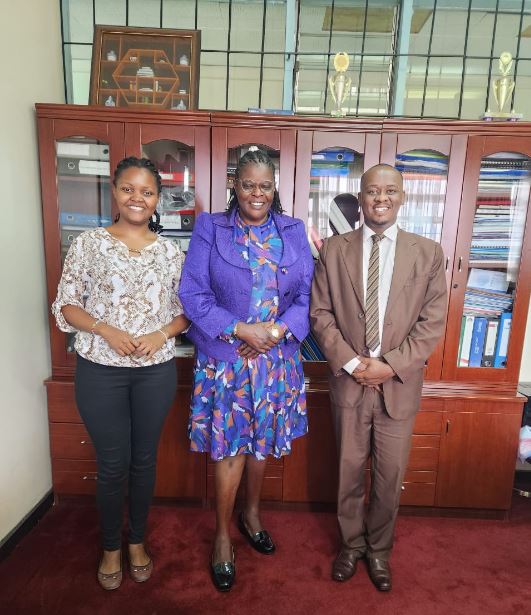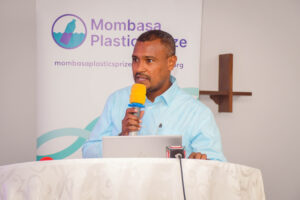Pathways Policy Institute and Government Join Forces to Promote Transparency and Accountability in Accessing Information

Judith Akoth the director Nursing and Midwifery services (centre) with Ms Betty Muchiri and Mr Solomon Kibue from Pathways Policy Institute (PPI) posing for a photo after a consultative meeting held recently at Afya House, Nairobi.
A local Think Tank Agency is at the forefront of enlightening Kenyans on how to easily access and get crucial information from the government.
Pathways Policy Institute (PPI), a renowned policy and accountability community-based think tank, is out to promote transparency and accountability in the utilization of various public funds, among them those allocated to COVID-19 menace.
Recently, PPI held a crucial meeting with the director of nursing and midwifery services in Kenya, Dr Judith Akoth where they discussed accessibility to information.
The meeting, organized in partnership with the Africa Health Budget Network (AHBN), which took place at the MOH headquarters at Afya House in Nairobi, was also aimed at shedding light on the accessibility of data concerning COVID-19 expenditures for the public in the country.
PPI, operating under the theme “Meaningfully Engaging Communities (MECY) with more emphasis on Population, Health, and Environment (PHE) as well as Climate Justice Pathways,” is dedicated to fostering local solutions to Universal Health Coverage and addressing the ongoing crisis of global warming through a Primary Health Care (PHC) outlook.
One of the core objectives of the meeting was to emphasize the importance of citizens being proactive in seeking out the information provided on government websites, as stressed by Dr Akoth.
She highlighted the need for enhanced accountability and transparency across all departments and urged citizens to exercise their right to access information to influence public policies, budgets, and expenditure processes.
Already, the country has the Access to Information Act, designed to promote an open and democratic society, facilitate public debate, and enhance the accountability and transparency of public institutions.
However, there is a growing need to ensure that this information is readily available and accessible to the public, especially during times of crisis such as the recent COVID-19 pandemic.
During the pandemic, Kenya and other African countries received substantial amounts of donor funding to respond to the crisis, some of which were said to have been misappropriated. Established in 2019, PPI has been at the forefront of creating a safe space for advocacy and community involvement in shaping Primary Health Care, Sexual Reproductive Health, and Environmental Policies through research, training, and capacity building.
Dr Akoth explained that the funds received by Kenya to combat COVID-19 were primarily donations and internal fundraising efforts from various partners. These funds were predominantly allocated to the purchase of Personal Protective Equipment (PPE) for healthcare workers across the country.
During the meeting, Dr Akoth responded to several key questions about the allocation and distribution of COVID-19 funds. Notably, she highlighted that the country had distributed a total of 23,359,310 vaccine doses so far with this information being uploaded on the national health website.
Kenya planned to fully vaccinate 19 million adults (70% of the adult population) by the end of June 2023, and the entire adult population of 27 million by the end of the year.
Kenya also aimed to fully vaccinate 2.9 million teenagers aged 15-17 years (50% of the population) and the entire teenage population of 5.8 million by the end of December 2023.
Regarding the accessibility of information, she confirmed that the national government’s website, www.health.go.ke, served as a comprehensive platform providing the public with easy access to a wide range of information.
When discussing challenges facing transparency, Dr Akoth acknowledged that the country had initially faced issues with data accessibility due to a breach in a contact tracing and home care app for COVID-19 patients called KoviTrace.
However, these concerns were promptly addressed, and all relevant information is now uploaded onto the government website, ensuring transparency and accountability.
To further improve government transparency on COVID-19 financing, Dr Akoth highlighted the importance of timely reporting, citizen engagement, feedback mechanisms, and active monitoring and reporting by civil society organizations and the media.
The meeting concluded with Dr Akoth emphasizing the importance of public awareness regarding the availability of information on the government website. It was highlighted that all the necessary data required to ensure transparency and accountability around COVID-19 funds are accessible to the public.
The upload of information on the official government website represents a significant step toward fostering transparency, accountability, and public engagement in COVID-19 financing.
As citizens become more empowered to access and analyse information, the pathway to effective governance and responsible use of resources becomes clearer, leading to a stronger and more resilient society in the face of future challenges.
During the meeting, PPI was represented by it’s Communications Associate Betty Muchiri and Finance Director Solomon Kibue.







